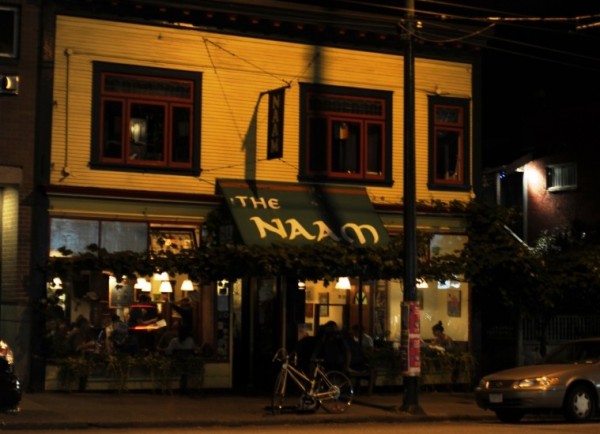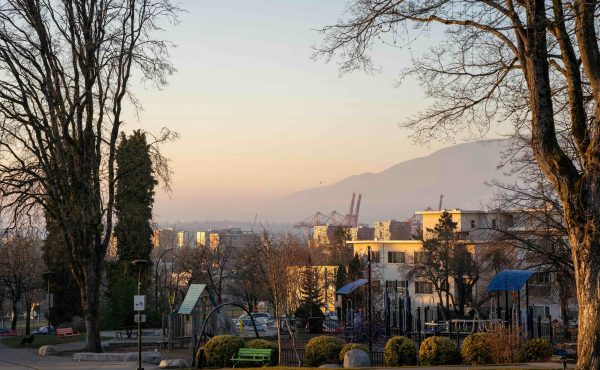

[Spacing Vancouver is proud to present this ongoing series about how food helps define the city. Dr. Lenore Newman and Katherine Burnett look into the restaurants that represent Vancouver and how its culture has developed. Vancouver’s diverse food scene is one of its defining core defining elements. Like most cities it is often the restaurant and food establishments that drive how Vancouver’s culture is experienced by locals and outsiders alike. This series examines those restaurants that help to define and change Vancouver’s food culture along with the City’s urban development.]
Afterhours, Vancouver’s streets can be a quiet, hungry place for the night owl. The Naam is a rare beacon of warmth in the night, and though every aspect of the neighbourhood known as Rainbow Road has changed since the flower children ruled in the 1960’s, this Kits restaurant is part oasis and part history lesson.
Established in 1968, The Naam is the oldest vegetarian restaurant in Vancouver. During the rise of the hippie movement and the counter culture in North America, many young people began to turn to the teachings of Eastern philosophical traditions, among them Buddhism and Hinduism, seeking ethical awareness and spiritual enlightenment. This movement incited a demand for natural, ethically produced foods, and fostered a small vegetarian and vegan community. However, there were few options for vegetarians and health-conscious consumers: dining out was often limited to a grilled cheese sandwich.
In 1967, a young hippie and student of Indian spirituality founded the first vegetarian restaurant in Vancouver, Golden Lotus Natural Foods. Its location on West 4th Avenue became the centre point of an intentional community composed primarily of young Buddhists. The crowds drawn to this restaurant, and to the likeminded businesses soon established in the neighbourhood, created the market for another vegetarian restaurant. The Naam Café was founded nearby by a former cook at the Golden Lotus, and originally benefited from the spill over of the other restaurant. With the influx of conscientious objectors from the United States in full swing, anti-war activists used The Naam for organising. When the Golden Lotus closed down in the early 1970s, The Naam also became the de facto gathering point of the hippie movement and different spiritual communities in Vancouver. It has been instrumental in fostering a wider market for vegetarian food in Vancouver, while continuing to rank among locals’ favourite vegetarian restaurants.

During the 1990s, The Naam developed a reputation its restaurant staff, largely composed of ageing hippies. The atmosphere was casual and laid-back, and rumours of servers exploring altered states on their shifts abounded. The restaurant was known as a place where one could get a solid vegetarian meal for a good price, but not necessarily in any kind of timely manner. The Naam was one of the only places a tired, hungry UBC student walking back from downtown at four in the morning could get a decent bite to eat, and developed a following among meat-eaters as well as vegetarians. Today, The Naam is nearly as busy for brunch as it is in the evenings.
Dining at The Naam is a little like stepping back in time. Although the menu has been updated over the years, adding such innovations as vegan Daiya cheese, it continues to reflect the restaurant’s hippie origins. Much of the menu is given over to healthy, whole, natural foods, such as the macrobiotic Naam bowl and the Buddha’s feast, both vegan dishes made with fresh vegetables, organic tofu, and brown rice. At the same time, many of the restaurant’s offerings can only be understood as stoner food; the croissant melt, with guacamole, cheese, and tomato, seems as though it was designed to beat the munchies. The Naam is possibly most famous for the miso gravy served with many of its dishes, which they are now selling in bottles at the restaurant and in health food stores throughout the city.

Reflecting its youth-oriented and counter-cultural beginnings, The Naam showcases local artists and musicians and is open 24 hours a day. The restaurant décor is influenced by both Buddhist and Hindu spirituality, while being firmly rooted in West Coast aesthetics. As well as vegetarians and health-conscious consumers, The Naam draws crowds of UBC students looking for a late-night hangout or an inexpensive meal.
Some of the servers are children of previous generations of staff, and the longest-serving employee has worked at the restaurant for 22 years. Other vegetarian restaurants have joined The Naam in Vancouver, including specifically Buddhist vegetarian restaurants. However, The Naam is a local landmark, famous for being the oldest of its ilk and for its contributions to what is now a thriving vegetarian and natural food movement in the city. Vancouver owes a little bit of its contemporary character to the people of Rainbow Road, and in The Naam, for a few moments it feels as though they never left.
•••
[Katherine Burnett is a writer and researcher focusing on public policy, urban geography, and food security. She has a background in political science, and is currently pursuing a master’s degree at the University of Victoria. Her current research focuses on food security and insecurity, urban governance, and the politics of the food system. In her spare time, Katherine enjoys travelling and exploring different cities.]
[Dr. Lenore Newman is the Canada Research Chair in Food Security and the Environment, and a Professor of Geography at the University of the Fraser Valley. She has a strong interest in examining the development of Canadian food culture and systems. She sits on the board of the Vancouver Farmers Market, and is passionate about food. Lenore is happiest when cooking, eating, drinking, or sharing meals with friends. Her website, sandandfeathers.com, presents her regular writing and research on all things related to food.]



